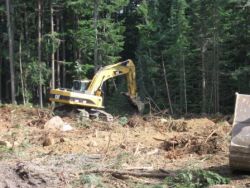Whistler's Olympic Story
BLOG POST posted on February 6, 2010 by Whistler Watch
Thought it was about time I post about SOME of the impacts Whistler has faced as a result of the games:
ENVIRONMENT
HABITAT LOSS:
1. Highway 99: Re-routing dissected the critical Pinecrest Wetlands habitat & resulted in death of hundreds of red-legged frogs – a federally-listed “species at risk.”
2. Whistler Olympic Park: Forest Logged for Nordic Events:
- Grizzly Bear habitat and populations impacted
- More trails built than will be used by Olympic competitors. The rest, the Legacy trails are unnecessary
- Pressure for Whistler Olympic Park to remain financially sustainable will push further development of the area.
3. Bus Transfer Station: New station built on a red-listed (rare) forested wetland.
Environmental studies were inadequate and ignored previous studies identifying the area as “rare” ecosystem.
- Local government and residents had no say in new location, since it was built on Crown land.
- Due to tight timelines, other sites & options not seriously considered.
TRANSPORTATION:
1. Rail was ignored as viable transportation to Whistler.
2. Olympic organizers (VANOC) drive around in 4,500+ single occupancy GMC SUVs and pick-up trucks.
3. Olympic spectators and dignitaries flying in from around the world, many on private jets and limos.
ENERGY & WATER USAGE:
Energy usage for 2010 Games has been massive. Biggest “white elephant” is the Whistler Sliding Centre, site of bobsled, luge & skeleton. Keeping the track cold requires more energy than that used by Whistler & Blackcomb mountains combined!
WASTE GENERATION:
Attempts have been made to minimize waste, but waste can be spotted everywhere - from banning re-usable mugs & water bottles in venues, in favour of Coke to sell its single use drinks(!) to areas being paved to house “temporary” structures.
SOCIAL COSTS
1. Housing - Many locals have been evicted from their rental suites for the Olympic period, often with little warning to house the police. Rental costs have increased as landlords cash in on the housing crunch.
2. Homeless residents have been relocated from private lands they have lived on for years, for the games.
Civil Liberties
1. Local activists phoned, followed & photographed by the police despite a long history of peaceful activism.
2. No access to Olympic venues for demonstrators and use of “protest pens” despite assurances from police that freedom of speech would be protected.
3. Whistler Council not sitting for three months – Whistlerites left with no local representation.
Violence Against Women
Violence incidents against women expected to rise 10-36% during the Games (for Vancouver and Whistler). As a result, Howe Sound Women’s Shelter is preparing for an increase in services, despite recent government funding cuts.
Over 40,000 women were trafficked for the Athens 2004 Olympics and over 10,000 for the Sydney Games.
Now that we have the background stuff out of the way, future blogs will be shorter and more up to date about what is currently happening on the ground up here...
The site for the Vancouver local of The Media Co-op has been archived and will no longer be updated. Please visit the main Media Co-op website to learn more about the organization.
